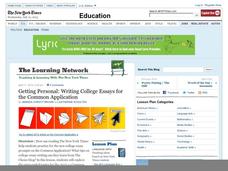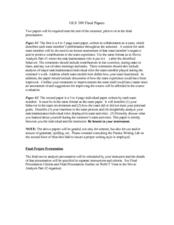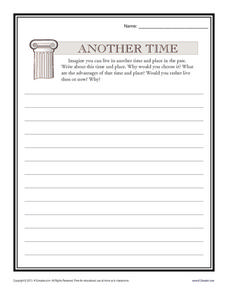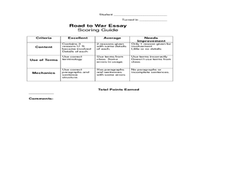The New York Times
401 Prompts for Argumentative Writing
Sometimes the hardest thing about an argument essay writing assignment is coming up with a question. A four-page list of prompts includes a range of topics, from social media and smart phones to video games and sports. The list is a...
College Board
2010 AP® English Literature and Composition Free-Response Questions
Three free-response prompts provide scholars an opportunity to practice for the AP® English Literature Composition exam. Using released prompts from the 2010 free-response section, writers craft an essay about the experiences of a...
Thomas Jefferson Foundation
Personal Morals vs. Political Moves Document Based Essay
Was Thomas Jefferson a hypocrite? Tackle this question with primary source analysis and an essay. The packet includes historical background, a writing prompt, a combined outline and checklist, and ten primary documents paired with...
PBS
The Symbolism of Castle's Bedroom in Ghost
To conclude a unit study of Jason Reynold's Ghost, class members examine how Castle's feeling about his bedroom change over the course of the novel. Groups use the provided graphic organizer to identify the plot of the novel and then use...
The New York Times
Getting Personal: Writing College Essays for the Common Application
Develop an understanding of the open-ended questions that are a part of the college Common Application. Future college learners collaborate, discuss prompts acquired from the application, and philosophize on their plan of attack for the...
American Battlefield Trust
Contrasting the North and South Before the War
Fundamental differences between the North and South led to the South adopting a system of enslaved labor. These abstract ideas become concrete when class members create a standing cube using information provided in the resource. Young...
PBS
Lessons in Leadership, Roosevelt Style
It's easy to criticize those in power until you're sitting at their desk, faced with the same decisions. A history lesson prompts secondary learners to research the Roosevelt presidencies through the lens of leadership and...
New York State Education Department
US History and Government Examination: January 2012
What led to the United States Civil War? Interested historians consider a variety of political, social, and economic factors using primary sources and an essay prompt in an authentic high-stakes test. Primary sources include political...
EngageNY
End of Unit 2 Assessment, Part 1: Drafting the Essay
Young writers use the class time to complete a draft argumentative essay. In answer to the Pygmalion end-of-unit prompt they discuss the change seen in Eliza's inner identity.
National Constitution Center
Born in the U.S.A: Music as Political Protest
Though often used in shows of patriotism, Bruce Springsteen's 1985 song "Born in the U.S.A." is critical of America's role in the Vietnam war and its treatment of American veterans. High schoolers analyze the song's lyrics in an activity...
Museum of Tolerance
Making Lemonade: Responding to Oppression in Empowering Ways
An activity focused on tolerance encourages class members to consider how they might respond when they or someone else is the target of oppression and discrimination. After researching how some key figures responded to the anti-Semitism...
NPR
This Isn't Right: A History of Women in Industry
Women were in the workplace long before Rosie the Riveter pushed up her sleeve. Learn about the working options available to women during the Industrial Revolution, the Progressive Era, and the Great Depression with a lesson that prompts...
Curated OER
Final Papers: Writing Prompts for Evaluating Team and Individual Performance
To be used in connection with a group project or at the end of a unit, this handout contains two essay writing prompts. The first prompt asks a group of learners to work together to evaluate their groups' performance as well as each...
Curated OER
A Year in Review: The Memoir
If you are planning a unit on memoir and autobiographical narrative, you should consider this resource. Using Internet research skills, pupils review works by James Frey and Henry David Thoreau. In response to these works, learners...
Theodore Roosevelt Association
Defining America's Role in the World
As the first American president to win the Nobel Peace Prize, and only one of four presidents to do so in United States history, Theodore Roosevelt's foreign policy achievements and preservation of peace are often overshadowed by his...
Curated OER
Essay Writing
Are your learners working towards their GED? First they study the GED essay rubric, and then they read a sample essay as a group. After studying the basic elements, they write an essay of their own. After peer editing, they revise their...
Curated OER
Writing Prompts for High School
Are you teaching a high school language arts class and stumped for writing topics? Five pages of writing prompts for all kinds of writing should help you out. Many of these prompts refer to texts that are not included in this resource,...
K12 Reader
Another Time
Write about another time and place to live with an interesting writing prompt. It presents young writers with the challenge of choosing another time and place in the past and explaining what the advantages and disadvantages of that time...
New York State Education Department
Global History and Geography Examination: August 2016
Challenge class members with an architectural resource that asks them to use a variety of skills to answer multiple choice questions as well as several essay prompts about the streets and house fronts of ancient Athens. One question asks...
K12 Reader
Swooping Seagull
Take a dramatic trip to the beach with a narrative writing prompt. Kids examine a picture of a seagull stealing food from a man at the beach, and write a short story from either the seagull's or the man's perspective.
EngageNY
Grade 9 ELA Module 1: Unit 3, Lesson 20
The final session in this 20-lesson plan unit asks individuals to use their Quick Writes, discussion notes, worksheets, and annotated text to craft and support a claim about how Shakespeare develops either Romeo or Juliet as tragic heroes.
9/11 Memorial & Museum
The Destruction and Rebuilding of the World Trade Center
How did an investigation into the causes of the collapse of the Twin Towers, as a result of the 9/11 attacks, inform the construction of the new 1 World Trade Center? That is the central question of a resource that asks class members...
Alabama Department of Archives and History
Nellie Bly to Dr. Peter Bryce: 19th Century Asylum Reform
What kind of treatment could a patient expect in an asylum during the 1800's? The abusive and neglectful conditions in 19th century asylums are the focus of a lesson plan that examines the work of reformers Nellie Bly, Dorothea Dix, and...
Curated OER
Early U. S. Involvement in World War II
Ninth graders examine how the U. S. was aided by the Allies in World War II before the U. S. declared war. They analyze the evolution of U. S. foreign policy from the beginning of WW II through U. S. Declaration of War

























